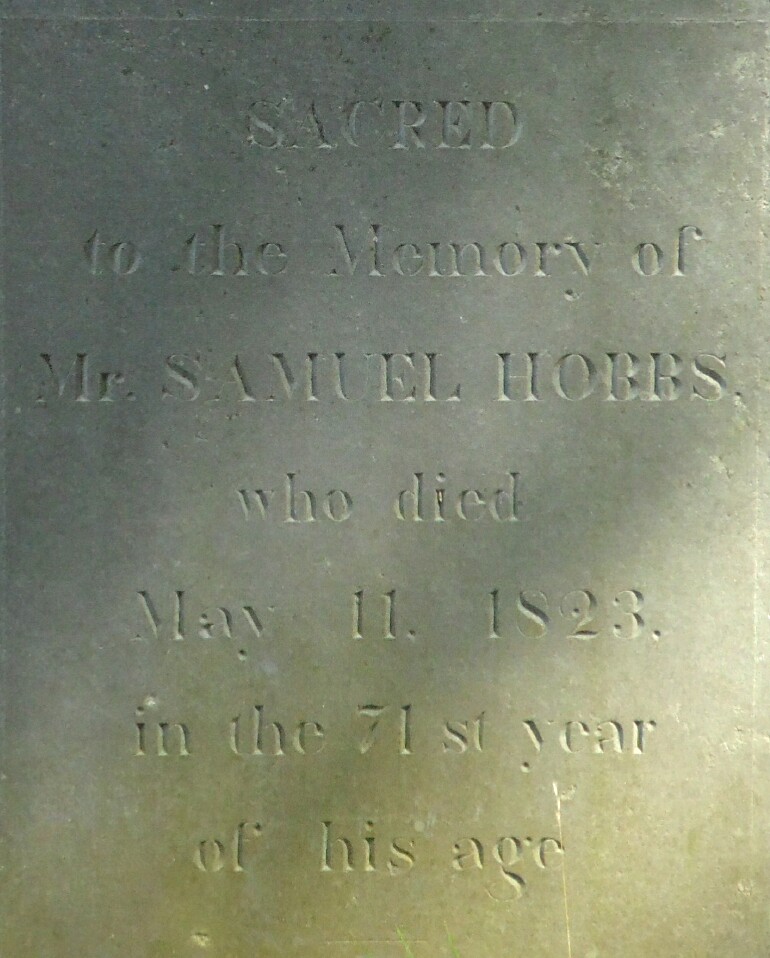The announcement I received from the museum says, “Samuel Hobbs was born in 1750 in Sturbridge,” and I think that’s an error, but there’s a lot of slightly conflicting information about this man.
When Hobbs died in May 1823, the Independent Chronicle and Boston Patriot newspaper ran this death notice:
In Sturbridge, 10th inst. Mr. Samuel Hobbs, aged 70—a valuable citizen.The vital records of Sturbridge contain multiple entries, saying Hobbs died on 11 or 12 May in his 71st year or at age 71. His gravestone says he died “May 11, 1823 / in the 71st year / of his age,” so I’m sticking with that.
There’s no mention of this Samuel Hobbs’s birth in the Sturbridge records. Nor in the published vital records of Lincoln, which I checked because Samuel F. Drake’s Tea Leaves stated that Hobbs was born in that town in 1750.
But Hobbs’s reported age at death matches an entry in the vital records of Weston, saying that Ebenezer and Eunice Hobbs had a son named Samuel born on 3 July 1752 and baptized on 12 July. Furthermore, George Davis’s A Historical Sketch of Sturbridge and Stockbridge, published in 1856, stated, “Mr. Hobbs was a native of Weston.”
The printed vital records of Weston also say this Samuel died in 1756, which would make authors wary of saying he survived to the Tea Party and beyond. But that entry has been corrected in the American Ancestors database to say that a sister Susanna died and Samuel survived.
The Rev. Samuel Woodward of Weston married Samuel Hobbs to Lucy Munroe of Lexington in November 1774. In October 1776 they had a son named Cyrus in Sturbridge.
Massachusetts Soldiers and Sailors of the Revolutionary War doesn’t list this Samuel Hobbs as serving in the army in the intervening months or later. His older brother Isaac, born in 1735, led Weston’s militia company later in the war, and his older brother Matthew served several years in the Continentals.
Samuel Hobbs prospered in Sturbridge, building a large house that lasted well into the twentieth century. He served in town offices. As the death notice above says, he was considered “a valuable citizen.” However, that notice didn’t say anything about the destruction of the tea.
In 1855 the New England Historical and Genealogical Register published a genealogy of the Hobbs family. The compiler, George Hobbs of Maine, wasn’t sure about Samuel’s birthdate (“1750 or 52”), but he stated:
He was a farmer, but the business of a tanner and currier he also followed with some success. He was an ardent patriot, and, in 1773, while a journeyman in the employ of Simeon Pratt, of Roxbury, joined the famous party, who, in disguise, threw overboard the tea in Boston. He used to say that the whole chests of bohea, weighing 360 lbs., were rather heavy to lift. He settled in Sturbridge, where his four sons remained. He was a most excellent man, and ever held an elevated position in society. He died in May 1823, aged 72 years.Again, Hobbs was seventy years old when he died.
That published genealogy was enough for Samuel Hobbs’s Tea Party connection to be mentioned by local historians like George Davis. Francis S. Drake listed him among the participants in the Tea Party “derived principally from family tradition.”

No comments:
Post a Comment